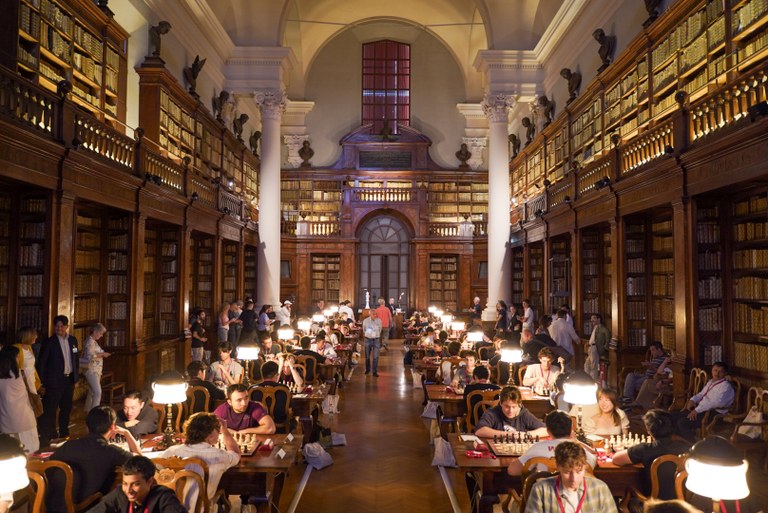
In deze prachtige bibliotheek mochten twee van onze leden samen met een team van de Universiteit Maastricht spelen! Onderstaand verslag van Michal Bodický in het Engels én een partij met commentaar van Paula Gîtu.
Bologna Recap 2025
The Alma Mater University of Bologna hosted the second edition of its university chess tournament, once again extending a kind invitation to Maastricht University. This year’s event, held in September, took place in the breathtaking 18th-century university library—an inspiring setting in the very heart of the oldest university in Europe. Only a few places could offer a more fitting atmosphere for this event.
Eighteen teams took part, representing some of the world’s most renowned universities: Cambridge, Oxford, Yale, Harvard, the Sorbonne, Padova, Milano Bicocca, Keio University from Japan, Samarkand, Pisa, Bologna, Boğaziçi University from Istanbul—and, of course, our own Maastricht University. Competing among such a company was both a privilege and a challenge, and I am deeply grateful for the opportunity to once again assemble a team ready to strive for the highest ranks.
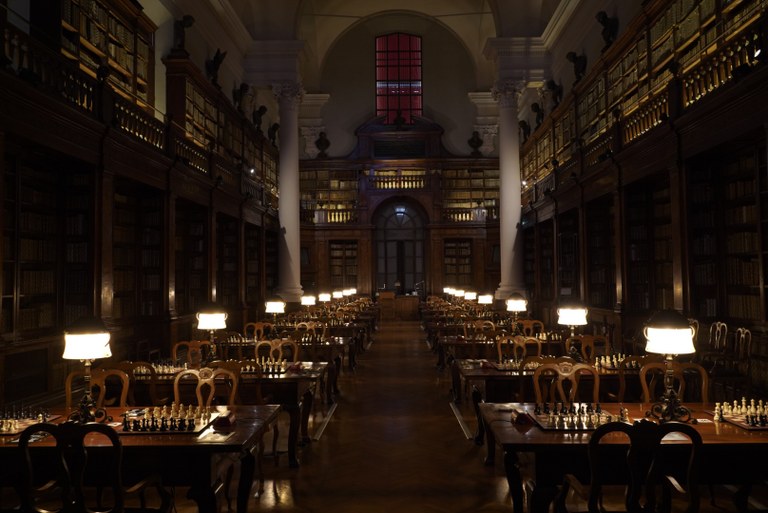
Maastricht University Team
Based on our experience from the previous year, forming the team was a straightforward task. The first board naturally went to Christian Seel, Professor of Economic Theory, Market Design, and Regulation at SBE. Holding the title of International Master, Christian’s level of play is essentially that of a Grandmaster. His uncompromising style and readiness to challenge anyone made him one of the most formidable players in the entire tournament.
Our second board defended a newcomer to the team, Nils Heldenbergh, a second-year bachelor student of European Relations at FASoS. Nils recently surpassed the 2200 rating mark in classical chess, making him our second-highest rated player. His style builds on well-established openings, from which he can gradually outplay any opponent. This makes him not only solid but also dangerous for any opponent.
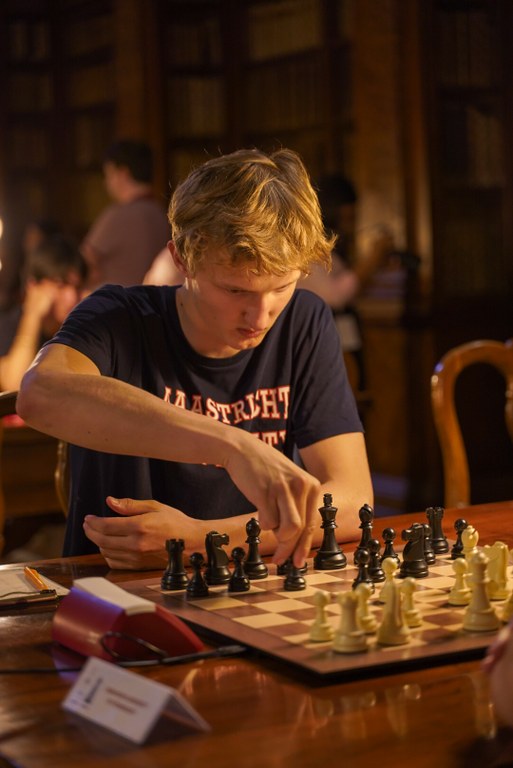
I, Michal Bodický, played on the third board. I am a fourth-year PhD student at SBE, with a research focus on game theory. After a disappointing performance on the second board last year, we decided it would be best for me to play on the third board this time, to let me concentrate on supporting the team with opening preparation, and to keep an eye on the overall match strategy during the rounds.
Our fourth board played Paula-Alexandra Gîtu, a third-year PhD student at SBE, who investigates the impact of unhealthy food advertisements on youth. Paula is a very strong player with the WFM title and has took part in several Chess Olympiads as a member of the Moldovan national team. Interestingly, alongside her chess career, she also played for the Moldovan women’s football team in the UEFA U-19 Championships.
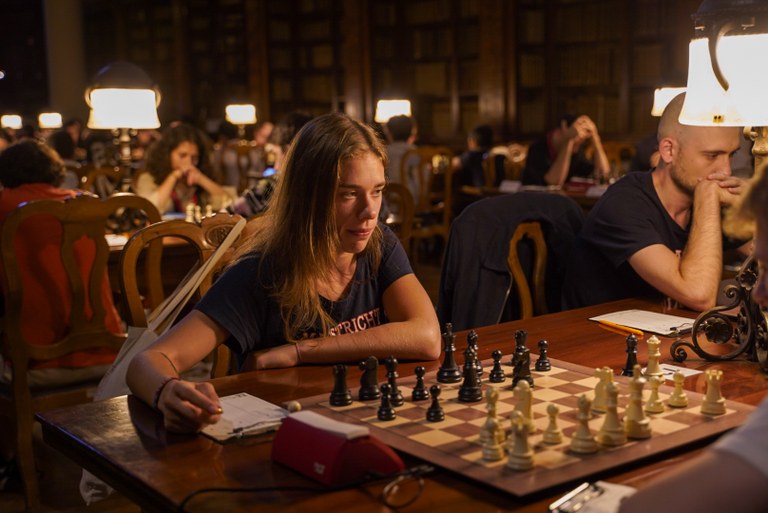
Overall, we fielded one of the strongest teams in the competition. All of our players have, at some point, surpassed a 2100 classical FIDE rating, and our current average classical rating was close to 2220.
The Tournament
Our entire team traveled to Bologna a day in advance, giving us time to acclimatize to the beautiful city and its pace. The tournament organizers were eager to welcome all the teams and invited us to the university chess club’s regular Thursday rapid tournament. This provided a nice warm-up, although Paula and I could not participate due to our late arrival to Bologna. Nevertheless, Christian won the event, and Nils finished fifth.
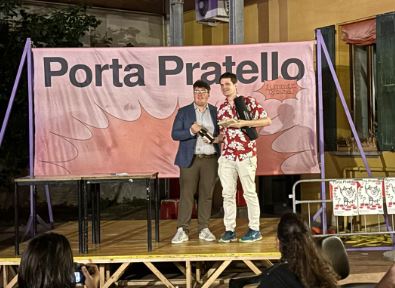
The tournament began the following day, consisting of five rounds with a time control of 45 minutes per player plus a 10-second increment per move. Two rounds were held on Friday, two on Saturday, and the final round on Sunday. The pace of play was a relatively slow rapid tempo, which proved somewhat tricky: the small per-move increment combined with the large initial time meant that players often had to accelerate significantly in the final phases of their games.
The organizers arranged the first-round pairings “by hand,” matching teams based on historical rivalries. This meant Oxford faced Cambridge, Harvard took on Yale… and Maastricht went up against Eindhoven, last year’s champions—even though we hadn’t been aware of any rivalry with them beforehand. The first round was definitely a memorable one!
Round 1: Maastricht University – Eindhoven University of Technology: 3,5 – 0,5
Our first match was already a challenge, as Eindhoven fielded a strong team. Fortunately for us, they had lost some of their key players from the previous year, and we went in as clear favorites, being stronger by roughly 300 rating points on boards 1, 3, and 4.
I was the first to finish, outplaying my opponent with the white pieces in a relatively technical game.
Paula equalized quickly with black, soon obtained a better position, and confidently converted her advantage.
Nils’s opponent played a very solid game; Nils tried hard to create winning chances but eventually found himself in a worse position. Still, he showed good fighting spirit and managed to hold a difficult four-rook endgame to a draw.
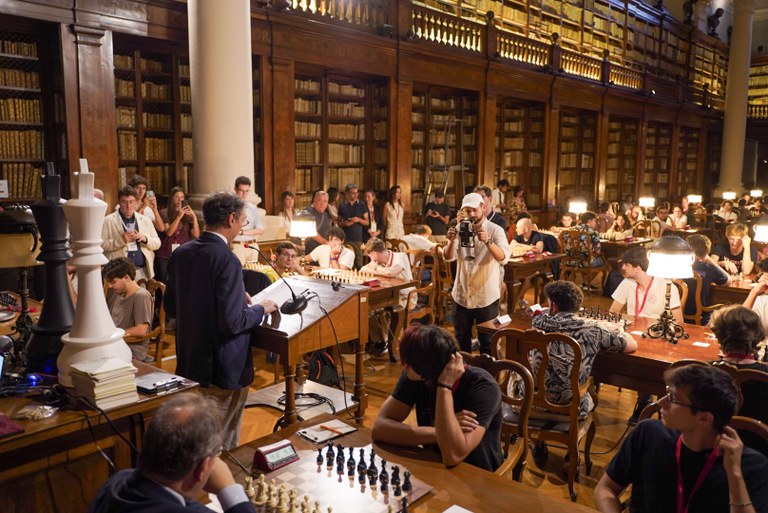
Christian was the last to finish, gradually outplaying his resilient opponent. After winning a pawn, he converted the resulting knight-versus-bishop endgame with four pawns against three.
This strong performance gave us an excellent start: with a convincing score in the opening round, we immediately took the tournament lead!
Round 2: Trinity College Dublin – Maastricht University: 0 – 4

In the second round, we were paired against Trinity College, the winners of the Dublin derby in the opening round. On paper, we were clear favorites across all the boards, and we approached the match with confidence and eagerness to play.
Paula was the first to finish, defeating her opponent in a sharp battle with the white pieces. She sacrificed a piece for an attack, trusting her ability to navigate the complications. Her judgment proved correct—under pressure, her opponent faltered with a couple of decisive blunders, which Paula punished.
Christian followed with a smooth win, gradually outplaying his opponent step by step: first seizing the initiative, then securing the bishop pair, and finally converting into a winning endgame, which he crowned with a mating attack.
I was the next to finish. Playing black, I was waiting for chances. My opponent played well for a long time, so I started to press him on the clock. In an equal, yet tense, position, the time pressure became too much, and he eventually cracked.
With the match already secured, all eyes turned to Nils. His opponent defended resourcefully and made Nils work hard for every ounce of progress. After a long and grueling fight, Nils reached the theoretically winning endgame of rook and bishop versus rook. He pressed relentlessly, posing practical problems until his opponent finally went astray. A fine display of persistence from Nils.
With a clean 4–0 sweep, we took the sole lead in the tournament.
Round 3: Maastricht University – Università degli studi di Milano Bicocca: 3,5 – 0,5
After our good start, we knew we had to secure a team victory in the morning round against a strong side from Milan if we wanted to keep our chances of fighting for first place. Our opponents were particularly strong on the top two boards: Christian faced fellow economist, Professor and International Master Fabio Bellini, while Nils also met a very tough opponent. On the last two boards, however, we were the favorites—so the responsibility to put pressure on the opponents fell largely on Paula and me.
With the white pieces, I gradually pushed my opponent into a slightly worse position. Faced with a series of difficult decisions, he slowly faltered until his position collapsed completely.
Paula, on the other hand, got into serious trouble with the black pieces. Fortunately for us, her opponent failed to exploit it, blundered, and allowed her to equalize. Later, he misplayed again, and Paula showed no mercy, converting her advantage and scoring another full point.
Nils had a solid position, but instead of going for simplification, he blundered and lost a piece in the endgame—suddenly leaving his position hopeless. Yet he kept fighting, and, incredibly, his opponent blundered a piece back in one move, giving Nils a draw and securing the overall match win for our team.
Christian was the last to finish. With white, he ran into problems straight out of a seemingly innocent opening against his strong opponent. To shake things up, he sacrificed a piece for three pawns, creating sharp imbalances and relentlessly charging forward despite being objectively worse. Under pressure, mistakes happen: his opponent blundered a piece back and found himself worse. The game turned into a tense, complicated battle under severe time pressure, with Christian still pressing. In the final phase—a knight and five pawns versus a rook and two pawns—his opponent ran out of time. Christian, focused on the position, didn’t even notice at first and kept playing, until the referee stopped the game and awarded him the win.
The final score of 3.5 – 0.5 was very lucky for us, considering that at some point we were much worse on boards 1, 2, and 4. But our fighting spirit paid off: we never gave anything away for free and made sure to punish every mistake. To make things even better, the other two universities with perfect starts, Padova and Bologna, drew their match—leaving us as the sole tournament leaders with a perfect score!
Round 4: Università degli Studi di Padova – Maastricht University: 1,5-2,5
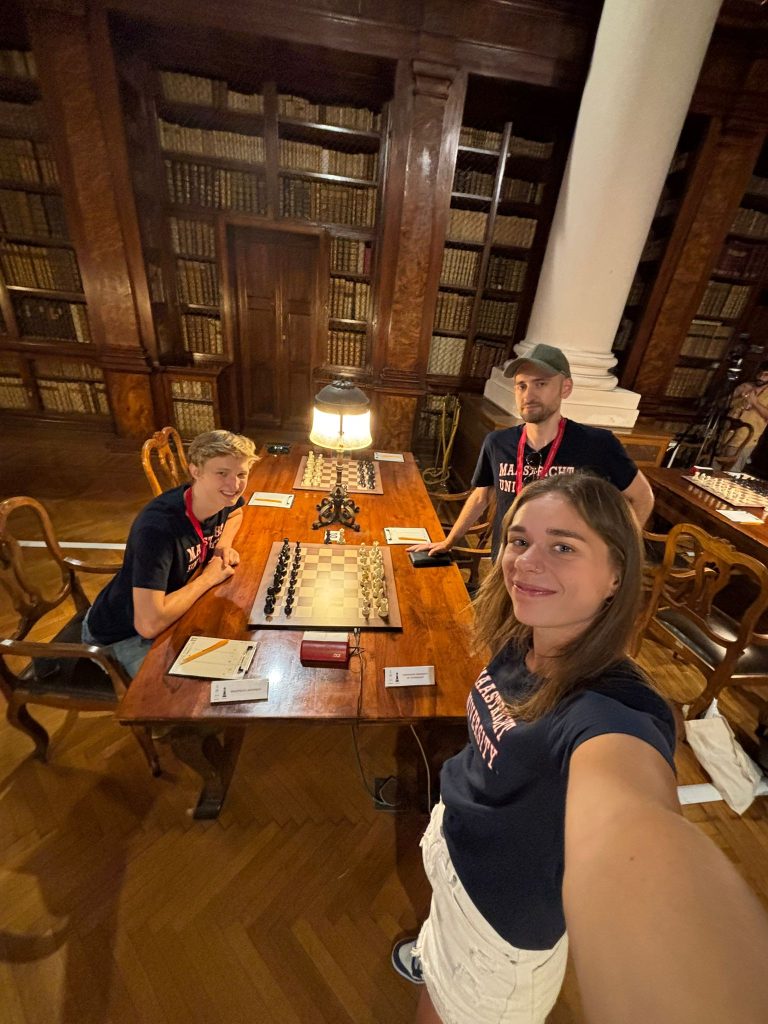
History repeated itself: just like last year, we faced our good friends from Padova in the penultimate round. This time, however, the stakes were much higher. A win would guarantee us a place in the top three and give us the best odds of winning the entire event heading into the final round. I felt we had a slight edge on the first board, while the other boards looked fairly balanced. We wanted this win badly.
Christian was the first to finish, completely annihilating his opponent with the black pieces in his pet line of the Philidor Defense. It was a flawless performance—and it came exactly when we needed it most!
Nils followed with a solid draw against a well-playing FIDE Master. The game went into a very sharp opening line, where Nils was better prepared and forced concessions from his opponent. However, running short on time, he chose not to continue in the sharp position, leaving it to Paula and me to bring home the match.
I finished next. With the black pieces, I had to defend for much of the game, but after sacrificing a pawn for activity in the middlegame, I never felt in serious danger. My opponent tried to trade into an endgame, but there my more active minor piece and his weaker king weren’t enough to give him any real winning chances. I kept the game going a little bit, hoping his time trouble might tell, but eventually I accepted that a draw was the practical result—especially since Paula was already in a safe position to secure the final half-point we needed.
On the fourth board, Paula handled her game with calm control. With the white pieces, she obtained a comfortable position without taking risks, keeping her opponent under control through the middlegame. In the endgame, she slipped slightly and had to defend carefully, but she did so precisely, and in a knight endgame she chopped off all her opponent’s pawns to claim the crucial half-point.
That sealed our 2.5–1.5 victory, guaranteeing us at least second place going into the last round. We were ecstatic—and eager for the grand finale!
Round 5: Maastricht University – Alma Mater Studiorum – Università di Bologna: 1,5 – 2,5
The final round arrived, and we were paired against the home team from Bologna, who fielded their strongest possible lineup. We were clear favorites on the first board, but slight underdogs on the remaining ones. Still, a team draw would have been enough to secure us the championship!
Paula’s game was the first to finish. Facing a heavily prepared opponent, she stuck to her usual opening, which unfortunately played straight into her opponent’s preparation. She was punished for every inaccuracy, and her position quickly went from difficult to hopeless. It was our first individual loss of the tournament, though credit must be given to her opponent for playing a near-flawless game.
Nils was the next to finish, playing black against an offbeat line in the Sicilian. He was under pressure throughout and missed a few chances to equalize. In mutual time trouble, both players blundered, but this time Nils was the one who failed to capitalize, and his opponent calculated accurately all the way to a mate.
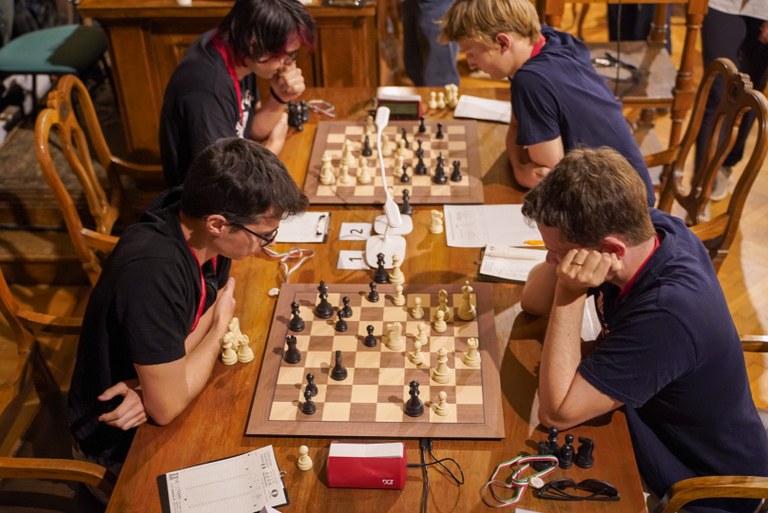
Christian then brought us back into the match with a vital win on the top board. Against a well-prepared opponent, he chose an anti-theoretical surprise with 1.d3, immediately taking his rival out of book. The strategy worked: in the complex middlegame that followed, Christian gradually showed he was the stronger player. After some mutual inaccuracies, he emerged with an extra pawn in an opposite-colored bishop endgame, which he confidently converted.
My game was the last to finish. With the white pieces, I chose a quiet, low-theory opening that kept my opponent at bay. At one point, I held a promising advantage, but a wrong choice of plan led to a very drawish opposite-colored bishop ending. Since the overall match result was still uncertain, my opponent pressed for a win, but without any real chances. As the situation in the team match unfolded, I eventually had to take risks and push for the full point myself—but with very limited resources. In the end, my opponent defended accurately under time pressure, and I had to settle for a draw.
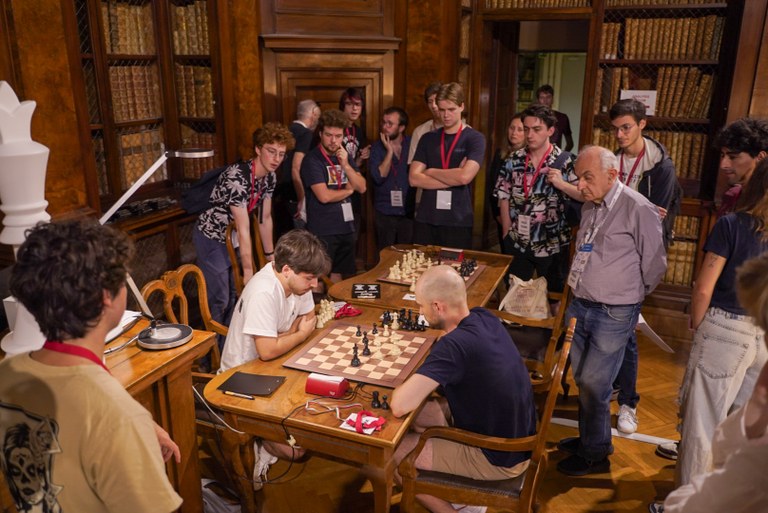
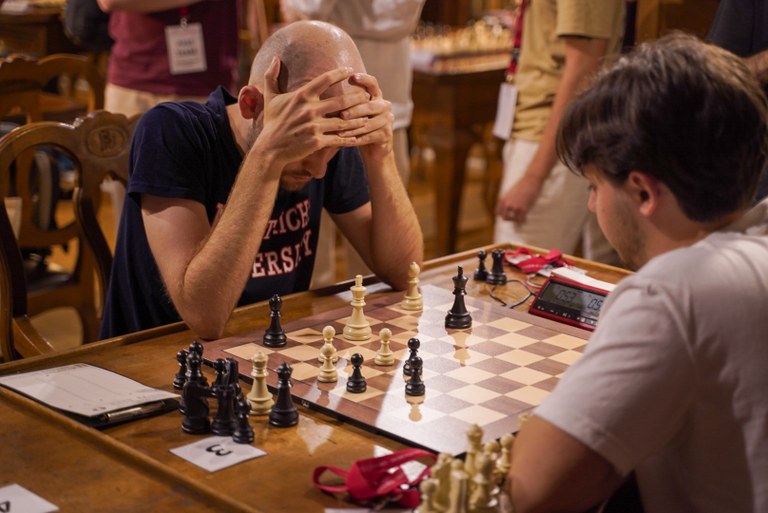
The final round was a bitter one for us, as both of our only individual losses in the entire tournament came in this last match. But that’s chess. Congratulations to Bologna for winning their home tournament!
Conclusion
As a team, we finished second out of 18 teams. We scored 4 wins and 1 loss, winning 12 individual games, drawing 6, and losing only 2.
Christian on the first board delivered an outstanding performance, scoring 5 out of 5. He dominated opponents with an average FIDE classical rating of 2250, performing at a level above 3000 rating points! I must say, it was much easier to play the matches when your first board consistently wins.
Nils faced a very tough task on the second board, meeting resilient opponents in every game. He showed tremendous courage and fighting spirit, scoring 2.5 out of 5 against opponents with an average FIDE rating above 2100.
My own task was somewhat easier, facing opponents with an average FIDE classical rating slightly below 2000. I scored 4 out of 5—not bad, though there was room for improvement. I am happy, however, that I never fell into a significantly worse position throughout the tournament.
Paula faced opponents averaging around 1930 FIDE classical rating and scored 3.5 out of 5, performing at a solid 2100 level. This makes her by far the best-performing female player in the entire tournament!
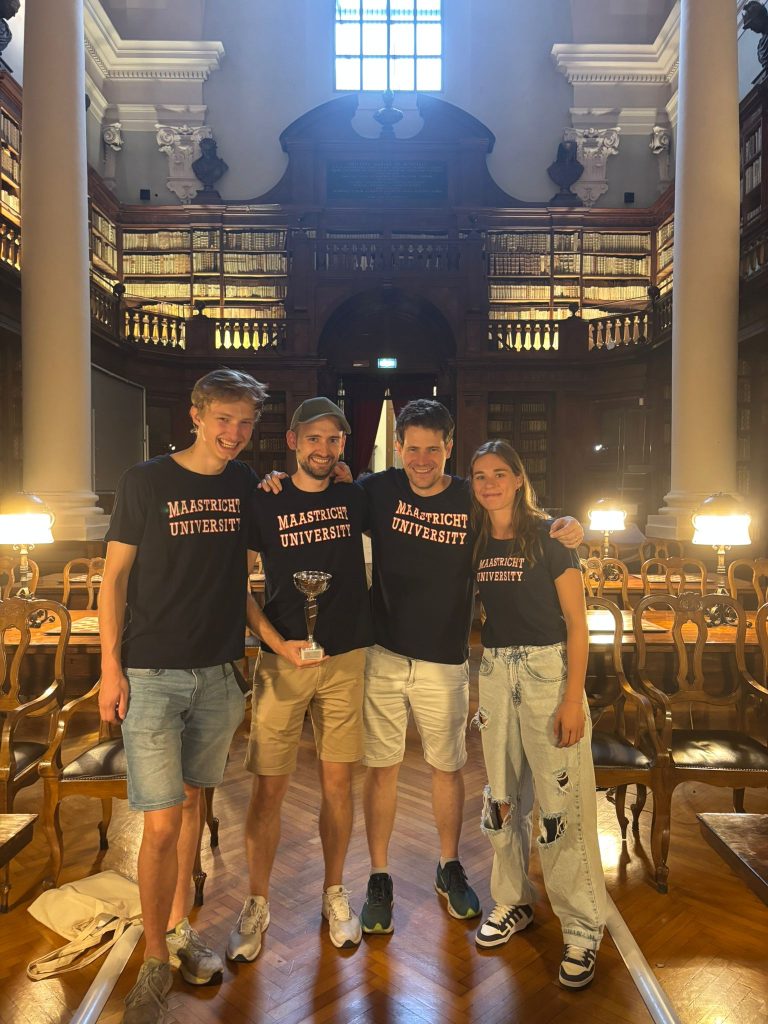
A big congratulations—and even bigger thanks—go to the organizers of this outstanding event and its excellent course. We hope the tradition of the Alma Mater Chess Tournament continues for many years, and that Maastricht University will have the pleasure of participating again.
We would also like to thank Maastricht University, in particular Liesbeth Vliet-Kruisifikx, for her invaluable help with our tournament preparation and organization!
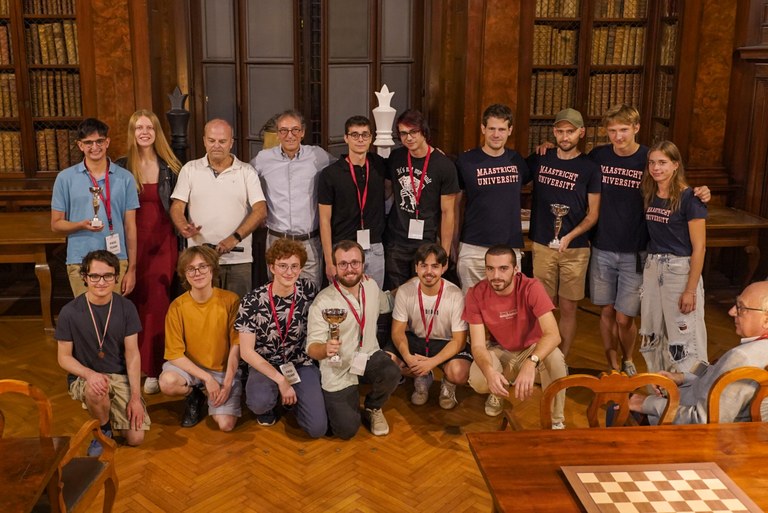
Final Standings
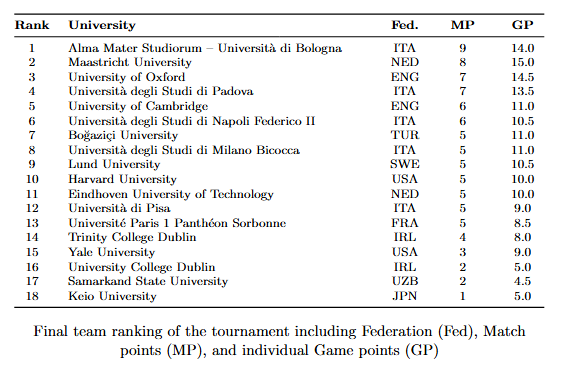



Thanks, Michal, for the wonderful report, and Paula for the excellent analysis of your game! I followed along watching live during some of matches and enjoyed immensely. Very instructive as well. Congratulations to all of your team and great job representing our city and university!